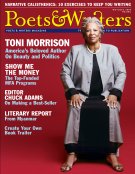"When your column runs underneath Garrison Keillor and Anne Lamott," Potts says now, "suddenly nobody can tell that a few months ago you were teaching twelve-year-olds in a faraway country."
Potts left Busan and filed dispatches from Laos, where he got cholera ("Retch-22: Laos in the Time of Cholera"); Turkey, where he got drugged and robbed ("Turkish Knockout"); Lebanon, where he met the craziest tour guide in the world ("My Beirut Hostage Crisis"); and of course Thailand, where he stormed The Beach.
In one scene in "Storming The Beach," Potts describes chatting over whiskey with an American couple named Todd and Ann about the difference between travelers and tourists. It's a never-ending debate between both kinds of people, most of whom consider themselves the former rather than the latter.
On the surface, it's a simple distinction. Tourists leave home to escape the world, while travelers leave home to experience the world. Tourists, Ann added wittily, are merely doing the hokey pokey: putting their right foot in and taking their right foot out; calling themselves world travelers while experiencing very little.
Potts considers the distinction to be blurry at best and meaningless at worst. And while that may be true, the terms do illustrate an important aspect of travel writing: Very few of us, it turns out, really know what we're talking about when we talk about travel writing.
"Narrowly defined, travel books are nonfiction accounts of journeys undertaken by the writer," says David Espey, author of Writing the Journey: Essays, Stories, and Poems on Travel (Longman, 2004) and a visiting professor at Bahcesehir University in Istanbul. "The journey is also one of the main metaphors for the course of human existence. Yet the public tends to lump travel books with guidebooks. As Bruce Chatwin said about himself, ‘I want to be put next to Chaucer on the bookshelves, but I end up next to Czechoslovakia on $5 a Day."
Chatwin, who died in 1989, was alluding to one of the main tensions within the genre of travel writing: narrative versus service. At the heart of this division are questions of intent: Is the purpose of a piece of writing to help the reader plan a vacation? Or is it to probe the human condition? Is it a service to the reader, or is it a form of art? Can it be both?
"It's tough," says George. "Even when I was at the San Francisco Chronicle, there was a tension between a really well-written story about a really awful trip, and a pretty well-written story about a trip that a lot of readers would like to take. You're trying to balance your interest as a person who loves good writing with what the reader wants in terms of useful information."








